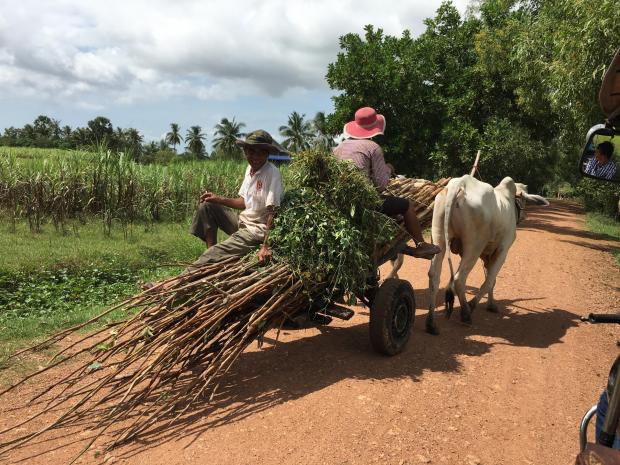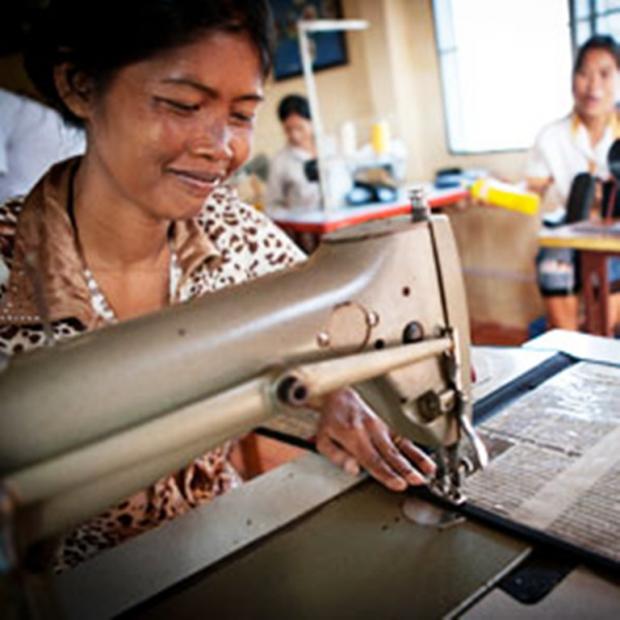LINA opened her restaurant two weeks ago in a fishing village in Kep, in the south of Cambodia, close to the Vietnamese border. Fifty years ago this coastal resort was known as Cambodia’s Cote d’Azure, and when you wander around in the back of a tuk-tuk you can’t help but notice the wide avenues and walled gardens.
These villas once hosted extravagant cocktail parties with stars such as Jackie Kennedy and Catherine Deneuve on the guest list. There were casinos and a zoo.
But Kep has changed: the walled gardens have overgrown and the Le Corbusier–inspired mansions that once looked out over the Gulf of Thailand are in ruins, pockmarked with bullet holes and blackened by mildew and mould.
Lina’s restaurant is an old fisherman’s shack. I asked why she didn’t restore one of the hundred or so old villas. She looked at me blankly. “Because I don’t like ghosts,” she said.
This was no trivial remark. When Lina returned to Kep from Vietnam at the age of eight, Kep was a ghost town. Vietnamese deserters had eaten the animals in the zoo and the Khmer Rouge had torched everything – and everyone – that emitted the merest whiff of decadence or intellectualism. There is no greater illustration of the ruthless tyranny of ideology over humanity. “When I came back here,” Lina recalled, “Those houses were filled with corpses. I don’t want anything to do with them.”
It’s a sentiment that is shared by the residents of Kep, this strange relic of a town, coming back to life despite the horrors of the past. In her new restaurant, Lina cooks a fantastic blue crab, spiced up with Kampot pepper, indisputably the best pepper in the world. She plans other projects to restore the old crafts that were wiped out by Pol Pot’s regime.
Other restaurants, managed by Tree Alliance, in Sihanoukville, Siem Reap and Phnom Penh have menus featuring tarantula with black pepper lime sauce, as well as more traditional fare like amok or rice noodles. But what makes these restaurants different is that the waiting staff and the chefs are all marginalised young people – many of them street children, who would otherwise have no chance of an education.

Tree Alliance is run by Nikolai, head of social business at Friends International. He doesn’t suffer fools gladly and is fiercely committed to his team, conscious that his business depends on tourists but sensitive to the balance between education and exploitation.
Tourism in Cambodia is a sensitive business. From taking selfies in the Killing Fields to child prostitution, the country has suffered the worst kind of sight-seeing. Even seemingly well-intentioned visits to orphanages are condemned by Nikolai.
There are 406 children’s homes in Cambodia, an increase of more than 60% between 2005 and 2015. But, as Nikolai will point out to you, eight out of 10 of these children still have a living parent. The truth is that many of the so-called orphanages abuse the children and stage visits, to wring as much sympathy – and cash – from the unsuspecting tourist as they can.
That’s why Tree Alliance doesn’t just work with the children, but also with their families, training them in the skills needed to make recycled products from tyres, magazines and cutlery, sold in the restaurants’ adjoining shops.

Glasgow Caledonian University is working with Nikolai on a project, the South Wast Asia Social Innovation Network, finding new ways for the universities to work with their communities.
I was there last month working with the academics, students and other partners to establish a special unit uniquely designed and equipped to bring about positive change. The students work with Nikolai and other social innovators to ensure that what they are doing responds realistically to the challenges their country faces.
New challenges emerge all the time. Unlike the rest of the country, which is still centred around rural communities, Phnom Penh is booming … with all the negative effects of unbridled construction we are so familiar with – pollution, congestion and social deprivation.
The units in the universities have been equipped with new technologies to help them meet these challenges – 3d printers, VR headsets, tablets – but perhaps more importantly, they are being trained in entrepreneurship, design-thinking and other techniques to unleash their creativity.
The units also act as incubators, nurturing new ideas and nascent companies that will have a social impact.
One of these companies, Demine Robotics, offers unique expertise in clearing landmines. Its founder, Richard, recalls his childhood spent avoiding the mines and seeing the maimed victims begging on the streets.
Cambodia is one of the most heavily landmined countries in the world – with an estimated four to six million land mines still buried somewhere in the country, creating its own challenge for farmers trying to cultivate otherwise fertile land. Using the unit’s space and equipment and working with the students, the company has become recognised internationally for its expertise in applying robotics to landmine clearance.
When I talk to Lina, or Nikolai, or the students in our partner universities, I am overwhelmed by their enthusiasm and resilience.
But, running a workshop with a group of students, I asked them to tell me something extraordinary about themselves. None of them said anything more interesting than that they were studying at the university. I wondered if they were somehow wary of unleashing their imaginations. As if there is still a residual trauma, an underlying fear that prevents them from dreaming too wildly.
Mark Majewsky Anderson is director of research and innovation at Glasgow Caledonian University
